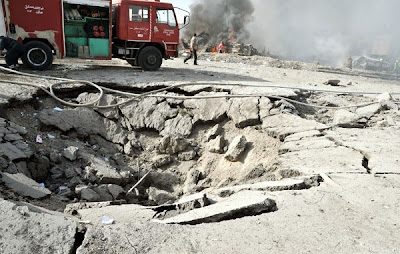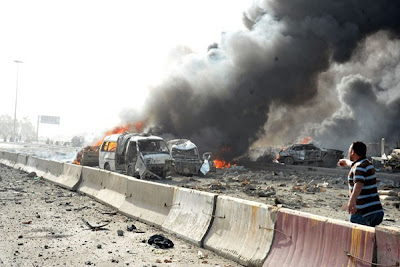Protest rally against Ahmed Tawfiq, Monday evening 28 May on Tahrir. (photo Tawfiq Shalabi)
So it´s final: Egypt's Supreme Presidential Electoral Commission (SPEC)
officially announced on Monday that Muslim Brotherhood presidential candidate
Mohamed Mursi and last Mubarak-era premier Ahmed Shafiq will face each
other in the runoff vote on 16 and 17 June. Mursi was the winner
with 24.78%. Number two, Shafiq, secured 23.66 % and Nasserist Hamdeen Sabbahi came third with 20.72 per cent. Abdel Moneim Aboul Foutouh
got 17.47% and Amr Moussa 11,13%. The turnout was 46.42 %.
The big questionmark form,any now is, how to stop Shafiq, who is as feloul (remnant of the Mubarak era) as can be. In een speech for the American Chamber of Commerce on 14 May he announced that he was never ashamed to tell that
Mubarak was his example and that he might choose Omar Suleiman as his vice president when elected. He promised that he, once he was president, would restore law and
order in a month.
Monday evening protest demonstrations were held against the fact that he is in the race in the first place. Thousands came to Tahrir and in Doqqi his headquarters went up in flames.
The office of Ahmed Shafiq is on fire. (Al-Masry al-Youm).
Mohammed Morsi, meanwhile, tries to pose as the candidate of the revolution, so that he can prevent that Shafiq wins. He tried to have a meeting with the other candidates Aboul Foutouh, Sabbahi and Amr Moussa, but all three declined,. Also he promised a ´national cabinet´ in case he´ll become president. So far not too many people went over to his side, although some, like the writer Alaa al-Aswani, voiced the opinion that Morsi is the only hope to keep Shafiq out of office. Morsi´s attempts at having deals with the more secular opposition are most surely to be continued
Hani Shukrallah, the editor of Al-Ahram Online, the English Al-Ahram so to say, wrote
an interesting piece about the results of the first round of these elections in which he pointed to the fact that the Muslim Brotherhood in fact lost if we compare the results with those of the earlier parliamentary elections. At that time the Ikhwan got 47%, this time it was a meagre 24,8%. Apparently the opportunist way in which the Ikhwan played its own games after the parliamentary win, was not appreciated by too many voters, Shakrallah concludes. In the countryside the Ikhwan still won, but in the big cities it lost to the candidate of the revolution, Hamdeen Sabbahi:
Alexandria, for years considered the Brotherhood's stomping ground
and foremost urban base in the country gives leftist Sabbahi first place
with 34.2% of the vote, compared to 15.3% for the Brotherhood's Mursi,
and the state's Shafiq at the bottom of the stack, in fifth place, with a
paltry 12%.
Sabbahi maintains his first place position in the nation's capital,
Cairo, with 34.6%, followed by Shafiq who does much better here than in
Alexandria, with 25.9% with Mursi in third place, with 20.1%, thus
earning the city founded by Alexander the Great the title of Egypt's
revolutionary capital.
and the case of Imbaba, which used to be a stronghold of the Islamists:
Yet another set of spectacular numbers is provided by the extremely
densely populated and horribly destitute Cairo district of Imbaba.
During the 90s of the last century, Imbaba had come under the sway of
the militant Al-Gamaa Al-Islamiya to such an extent that it was widely
named the Islamic Republic of Imbaba. When the police finally, and with
predictably tremendous viciousness, crushed the Gamaa by the end of that
decade, it was natural for the district to be inherited by the
Brotherhood.
Imbaba results in the first round of the post-revolution presidential
elections in 2012 had Sabbahi in first place (32.2%) followed by: Shafiq
(23.2%); Mursi (18.3%); Abul-Fotouh (14.7%). All of which seems to
support that not only was the Muslim Brotherhood's support waning, but
that in fact there was something of a backlash against the group.
In passing Shukrallah also debunks the conclusion of some that it was the 10 million Copts who helped Shafiq to his position of runner up. Shukrallah argues that Shafiq without doubt was helped by part of the Coptic population of of fear for a victory of the Islamist Muslim Brotherhood. But he points to the fact that the bulk of the votes for Shafiq came from rural provinces like Menoufia, where there are virtually no Copts. Also it is clear that many Copts, particularly the less well to do, voted for Sabbahi. The ´zabaleen´ - Cairo´s famous Christan garbage collectors, turned out to be a case in point.
Shafiq´s succes, Shukrallah thinks, was largely the work of the remnants of Mubarak's ruling National Democratic Party, which was
...never a political party
in any real sense of the word. Rather, it was a giant network of state
patronage, in which the intermarriage of money and power, businessmen
and bureaucrats at the very top is replicated down to the remotest
hamlet in the country. (....) Yet Shafiq's 23 per cent is not a sterling result by any means,
considering that that's the best that can be done by a decades-old
authoritarian state, run by the military, the intelligence and security
services and able to mobilise and put into motion a huge machinery made
up of the state bureaucracy and repressive machinery, as well as the
extensive network interlinking that machinery with local bosses and
dignitaries spread across the nation including anything from tribal
chieftains, village heads to billionaire industrialists and mangers of
state economic enterprises.
So also that machinery is not all powerful anymore, Shukrallah seems to think. Let´s hope he´s right.


.jpg)





































